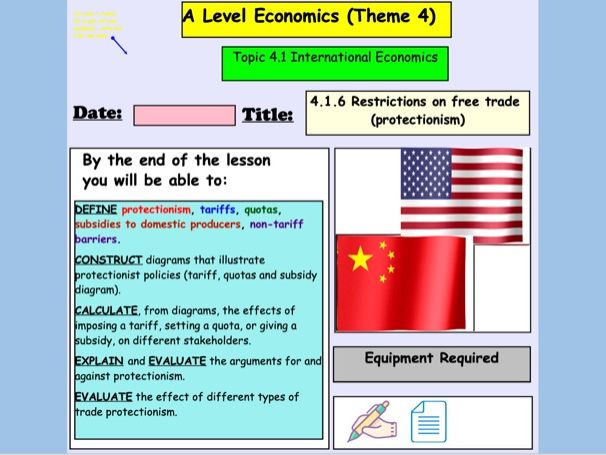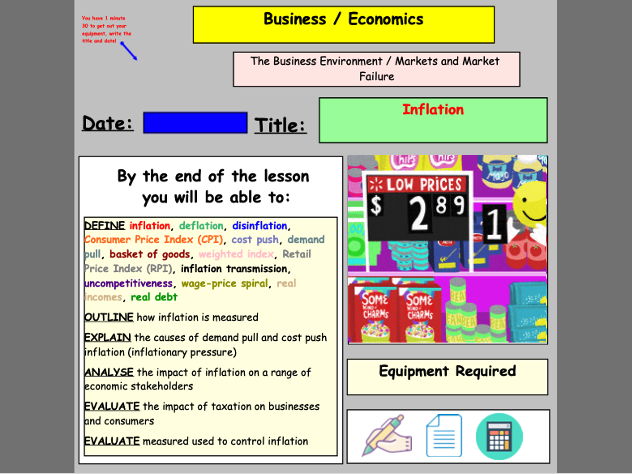84Uploads
10k+Views
6k+Downloads
Economics

Poverty, Lorenz Curve, Gini Coefficient
This presentation contains:
Colourful, detailed and engaging slides throughout
A ‘random name selector’ key term starter activity
7 timed past MCQs on a range of Economic concepts (interactive timer included) All answers included.
Activities throughout
Detailed notes throughout
Explanations of Lorenz Curve and Gini-coeffient
A comprehensive presentation.
There are 65 slides in total and this lesson took me an hour and a half to go through with students

Cross Elasticity of Demand
This PowerPoint includes:
An activity that introduces students to the concept of complements, substitutes and unrelated goods
A activity where students have to match pairs of complement and substitutes goods
An activity where students have to calculate the XED of a pair of goods
Detailed notes on how to calculate XED and what the data means
This presentation contains 21 slides and took me 45minutes to complete

Cross Elasticity of Demand
This PowerPoint includes:
An activity that introduces students to the concept of complements, substitutes and unrelated goods
A activity where students have to match pairs of complement and substitutes goods
An activity where students have to calculate the XED of a pair of goods
Detailed notes on how to calculate XED and what the data means
This presentation contains 21 slides and took me 45minutes to complete

Types of Taxation (Direct and Indirect)
A colourful and detailed presentation that explores types of taxation. Included in this presentation:
A fun Catchphrase starter activity where students have to look at images to guess the name of a product or service (my students love this!)
An initial true or false quiz about types of taxes (England specific)
4 slides illustrating how much tax revenue the UK generates in comparison to other countries and how that tax revenue is spent. A sample payslip is also shown to illustrate some of the deducations are taken from income tax
Colourful and detailed examples of the main forms of tax students need to know about (income, corporation, VAT, National insurance, business rates)
A ‘how much income tax does Boris pay!’ activity that students love. It illustrates that income tax brackets are different at different thresholds of income
Disadvantages of taxation
Useful tips and notes as to how to evaluate a question that refers to taxation
This lesson took me an hour to complete

Business Growth (Business and Economics)
Complete resource that explores organic and inorganic growth as well as constraints on growth

Purchasing Power Parity (Economics)
Colourful, engaging and informative lesson on PPP. Resource includes:
Colourful title slide with timer, learning objectives, animations and auto date
Editable recap starter activity on GDP / Economics growth
Step by step guidance as to what PPP through a range of activities relating to currency and exchange rates
A number of games and activities included, with answers
Sample PPP questions
There is a simple worksheet included

Business Objectives (Economics)
Activity on Business Objectives (Economics).
I sometimes use this resource during the teaching of this topic or as a revision and retrieval activity much later in the specification to see how much students remember.
Students need to fill in the boxes on page 1 using the boxes on page 2.
All answers included.
We often have a discussion as to why each answer is correct.

Comparative and Absolute Advantage
This is a complete lesson on comparative and absolute advantage.
The presentation explains both step by step and includes a range of games, activities and questions throughout.
There are also a couple of past paper questions with answers at the back.
A key term editable starter activity is included at the start.
Engaging and colourful throughout.
This presentation contains 45 slides and took me an hour and a half to go through with my students

Index Numbers
Complete lesson with additional worksheet on index numbers.
Included in this resource:
Activity on why quantitative skills are important in economics
Explanation of what index numbers are and why they are used
Step by step instructions are to how index numbers are calculated
8 activities on index numbers (all answers included)
This lesson took me an hour and a half to go through with my students

Economic Growth / GDP PPT AND Worksheet
This resource provides a comprehensive overview of how GDP is used to measure economic growth. Included in this resource:
A colourful and engaging title slide with learning objectives, animations, auto date, timer and bell
Recap starter activity on basic economic vocabulary (tile reveal activity). Answers included.
Detailed explanations of economic growth, GDP, GDP per capita, real GDP, total GDP, GPD value and volume, and GNI
Activities with answers for most of them (guess the price inflation activity for real GDP, GDP inflater activity - both with answers)
Detailed notes
Contextualised examples
Worksheet with tasks linked to PPT content. Activities include past paper questions, calculation activities and a ranking of nominal GDP task
This presentation and worksheet took roughly two hours to complete with my students.

Public Expenditure (Macroeconomics)
This 83 slide presentation covers public expenditure (4.5.3 in Edexcel specification).
Included in this resource:
A colourful and engaging title slide with learning objectives, auto date and time, animations and timer (with short bell)
Editable recap starter activity (knowledge recall)
Lots of interesting and engaging activities surrounding taxation, such as calculating Boris Johnson’s salary as PM, taxes on lottery winnings and game shows
Ranking activity on UK public expenditure
Detailed notes on capital and current expenditure, transfer payments, reasons why this may change and impact on wider economy
Contextualised examples and embedded videos, such as HS2
15 marker practice essay on financial markets (prior topic) with scaffolds and model answer
This lesson took me two hours to complete

Protectionism (Economics)
A detailed (102 slide) PowerPoint presentation on tariffs, quotas, trade subsidies and other forms of protectionsim.
This presentation includes:
Colourful slides
Videos
Activities
Links to syllabus
A detailed step-by-step instructions on how to draw tariff, quota and trade subsidy diagrams
Homework activities
Contextualised examples

Indirect Taxation - Economics
This presentation contains 73 slides and introduces what tax is before going into detail about indirect taxation and how to interpret diagrams that ask questions on indirect taxation.
Included in this presentation:
A Catchphrase starter activity
A true of false short quiz that asks students about 4 different types of tax around the world
Information about how much tax is generated in UK compare to poorer countries, what that tax revenue is spent on and how it is sourced
Distinctions between direct and indirect taxes. Although Econs exams focus more on indirect taxes, explaining direct taxes gets students engaged into the lesson
A ‘how much tax does BOJO pay’ activity that students really enjoy
Notes on indirect taxation
A step by step explanation of how to interpret and make calculations on tax diagrams
A calculation activity that students need to complete
Notes on disadvantages of tax increases
Evaluative suggestion points the extent to which tax rises are harmful
These slides took me an hour and a half to go through with my students.

Revenue (Economics) - TR, MR, AR, PED
This 100 slide lesson details:
the meaning of total revenue, marginal revenue and average revenue
the relationship between marginal revenue and price elasticity of demand
the concept of price-taker and price-maker
the formula used to calculate each type of revenue
diagrams for TR, MR and AR depending on whether the firm is a price-taker or price-maker
Engaging activities are provided throughout (answers included)
Questions and answers are also provided
Resource is colourful and interactive with animations throughout
This lesson took me 4 hours to complete with my students

Business Objectives (Economics)
This comprehensive resource contains 153 slides on activities, notes, exam questions , mark schemes, videos and animations to cover Business Objectives.
This resource explains what is meant by profit maximisation, revenue maximisation, sales maximisation and satisficing. This topic is well known for being challenging so this resource has been designed to explain these concepts step by step. Each objective has been contextualised with a range of activities (calculations, quess the box, ppqs, videos, etc) to help students understand.
The diagrams for these objectives are explained in my other resource (revenues, costs and profit).
This is a very detailed lesson and look me 5 hours to go through.

Demand (SMART NOTEBOOK VERSION)
Please note that this is a SMART NOTEBOOK presentation and not a PowerPoint presentation

Inflation
Included in this PowerPoint:
A detailed and colourful title slide that outlines the key learning outcomes and equipment required for the lesson
A starter activity where students are required to guess how the price of 5 goods and services has changed over time (closest for each round wins). Students really enjoy this activity
Explanation of why / when inflation becomes a problem, how it affects incomes and sectors where incomes have risen lower and higher than inflation
Explanation in basket of goods / weighted index
Step by step explanation of how inflation is calculated using weighted index
Activity (with answers) where students are required to calculate inflation changes using a weighted index
Activity (with answers) - identify which goods and services have been recently added and removed from the basket of goods
Explanation of difference between demand-pull and cost-push inflation with examples
Diagrams for both types of inflation
Presentation is detailed and colourful throughout
There are 52 slides in total and this presentation took me an hour and a half to go through.

Market Failure (Types of)
This lesson introduces the concept of market failure and explains what each of the key types of market failure are (externalities, under-provision of public goods and information assymmetry)
Included in this presentation is:
A colourful title slide with the key learning objectives
A ‘guess the question’ starter activity with answers
A step-by-step explanation as to what market failure is
Video showing an extreme example of externalities
Fill the blanks externality activity
Externalities sorting activity with answers
Positive externality activity
Information gap activity
Detailed and colourful notes throughout
This presentation is 32 slides in length and took me one hour to go through

Market Structures and Competition
This lesson can be used either to teach Business students about competition, market structures and how consumers can be affected by anti-competitive practices OR to teach Economics students about the different features of market structures and why competition / a lack of competition affects different stakeholders.
Included in this lesson:
A colourful and detailed title slide outlining the key learning objectives
An income elasticity of demand starter activity suitable for both Business and Economics students (calculation / explain / diagram question). A printable slide of the questions has been provided with a detailed answer key on next slide for peer marking.
A detailed and contextualised example of how a lack of competition affects different stakeholders (Epic Games legal battle with Apple over Fortnite)
Brainstorming activity on competition
A rank in order activity on types of competitive markets
Detailed notes on competition, monopolies, oligopolies, monopolistic competition, perfect competition, Game Theory, types of anti-competitive practices such as Cartels, OFT.
This presentation contains 37 slides and took me an hour to go through with my students.

Terms of Trade
This colourful and informative resource is fully comprehensive, and includes a number of tasks that test learning that do not require any marking from the teacher.
Included:
A detailed and colourful title screen, outlining the learning objectives and including an interactive timer and picture animations
A ‘guess the question’ starter activity with answers that tests understanding of earlier macroeconomic content
A quiz on UK imports and exports
Detailed explanation of ‘weighted indexes’ with questions and answer scheme included
Past exam question with mark scheme on terms of trade
Link to a video reviewing terms of trade and index numbers
Detailed explanations of factors affecting terms of trade and Prebisch-Singer hypothesis
8 mark question with mark scheme
Homework tasks, including a link to a Teams Quiz with 17 questions on terms of trade. Questions are self-marked when students respond
All resources took me 3 lessons to go through




















